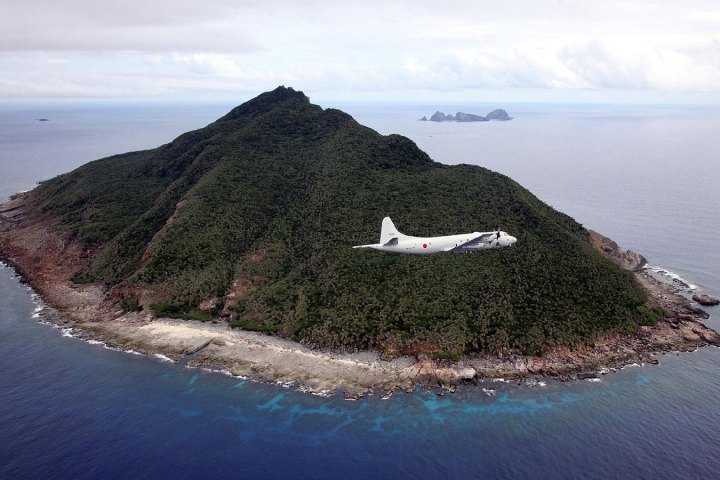|
Dark Skies: China¡¦s
Controversial Air Zone Clouds Biden¡¦s Beijing Visit
By Hannah Beech / Beijing Dec. 05, 2013
http://world.time.com/2013/12/05/dark-skies-chinas-controversial-air-zone-clouds-bidens-beijing-visit/?xid=rss-topstories&utm_source=pulsenews&utm_medium=referral&utm_campaign=Feed%3A+time%2Ftopstories+%28TIME%3A+Top+Stories%29

AFP / Getty Images
Japanese Maritime Self-Defense Force plane flying over the disputed islets known
as the Senkaku islands in Japan and Diaoyu islands in China, in the East China
Sea, in 2011.
The skies were blue in Beijing for U.S.
Vice-President Joe Biden¡¦s Dec. 4-5 visit ¡X a break from the smog that
occasionally envelops China¡¦s capital. But the atmospherics surrounding Biden¡¦s
trip to Beijing ¡X part of an East Asia tour that has taken him to Tokyo and then
leads him to Seoul ¡X were rather less sunny. On Thursday, while speaking to
members of the American business community in China, Biden blamed the Chinese
leadership for a security shift that has ¡§caused significant apprehension in the
region.¡¨
Biden was referring to China¡¦s announcement late last month that it wanted
certain powers over a patch of sky in the East China Sea. China¡¦s newly formed
Air Defense Identification Zone (ADIZ) overlaps with those previously designated
by both Japan and South Korea. (Any nation can form its own ADIZ since it is not
a legally binding zone in international law.) Beijing requires foreign aircraft
¡X civilian as well as military ¡X flying through its new ADIZ to provide flight
information beforehand to Chinese authorities. More controversially, China and
Japan¡¦s ADIZs clash in the skies over a disputed set of islands that Japan
administers but China also claims.
Beijing¡¦s initial announcement of the ADIZ referred to the possibility of
¡§defensive emergency measures¡¨ against any foreign offenders, even though the
ADIZ is not sovereign airspace but a self-designated buffer zone in
international skies. But there is little clarity on exactly what the Chinese air
force might do, leading to worries that a minor miscalculation in the ADIZ could
spark a larger conflict. The U.S. says it does not recognize the ADIZ. While in
Tokyo, Biden criticized the zone¡¦s creation as China acting ¡§unilaterally [to]
change the status quo.¡¨
Since the unexpected Nov. 23 proclamation of the new Chinese ADIZ, Japan, South
Korea and the U.S. have all flown military jets through the zone without
forewarning Beijing ¡X all without incident. Many civilian airliners have
provided flight plans to the Chinese, while Japanese ones have been advised by
their government not to do so. Still, the lack of transparency surrounding
Beijing¡¦s announcement has led to criticism both about the inchoate message of
China¡¦s p.r. machine and its contrasting approaches to different countries. The
U.S. and Japan were given just minutes¡¦ notice of the ADIZ announcement,
according to U.S. foreign-policy advisers and foreign diplomats in Beijing. The
South Koreans, says one high-level Chinese foreign-policy advisor, were given
more advanced warning. Beijing¡¦s relations with Seoul are considerably warmer
than those with Washington and Tokyo.
Chinese foreign-policy analysts, including ones who advise the Chinese
leadership, said that the internal discussion about forming an ADIZ has been
ongoing for at least a year. So why the last-minute notification to foreign
governments and the lack of lucidity about what the new zone entails? ¡§I see a
big necessity to clarify the ADIZ,¡¨ says Zhu Feng, the deputy director of Peking
University¡¦s Center for International and Strategic Studies. ¡§For example, when
China says it will take defensive measures if a plane crosses the ADIZ, what
does China mean? Beijing needs to clarify, and this will help the dust settle.¡¨
On Wednesday, Biden spent more than five hours meeting with China¡¦s President Xi
Jinping. The two had developed a personal rapport while they were both their
nations¡¦ vice-presidents. (Xi was promoted to President in March, although he
took up more important leadership positions before then.) In the run-up to
Biden¡¦s Asia trip, one senior administration official said that Biden ¡§knows
President Xi as well or better than probably any American, and possibly
virtually any leader.¡¨ But the U.S. Vice-President emerged from his marathon pow-wow
with Xi ¡X during which the ADIZ took up a significant portion of the discussion,
according to administration officials ¡X with little tangible to show off
publicly on this geopolitical issue. Still, as administration officials noted,
it will take the coming weeks and months to see how forcefully China enforces
the rules it appears to have set on its ADIZ.
Biden also took time on Thursday to chastise China over the treatment of foreign
journalists, some of whose visas have been held up during the annual year-end
visa renewal process for what are believed to be political reasons. Certain
foreign news websites that have exposed the Communist Party¡¦s dirty laundry are
blocked by Chinese censors, and individual articles or issues deemed too
sensitive are often banned as well. ¡§Innovation thrives where people breathe
freely, speak freely, are able to challenge orthodoxy, where newspapers can
report the truth without fear of consequences,¡¨ said Biden in Beijing.
In his trademark folksy manner, Biden noted the gulf that often exists between
the U.S. and China. ¡§We have our differences, and they are real,¡¨ he said on
Thursday. Here¡¦s just one of many contrasts: the same day that Biden met with
Xi, China¡¦s official news agency, Xinhua, noted that China¡¦s leader had ¡§urged
all Party members to learn Marxist philosophy to better understand the country¡¦s
situation.¡¨ The Chinese President, whose more august title is that of General
Secretary of the Chinese Communist Party, was leading a study group among top
Chinese leaders. Xi proclaimed, according to Xinhua, that ¡§Marxist philosophy,
which has revealed the general rule of human society development, still has
strong vitality.¡¨ Xi and Biden may be old acquaintances but philosophy, not to
mention geopolitics, remains a divisive force.
|
![]()
![]()
![]()